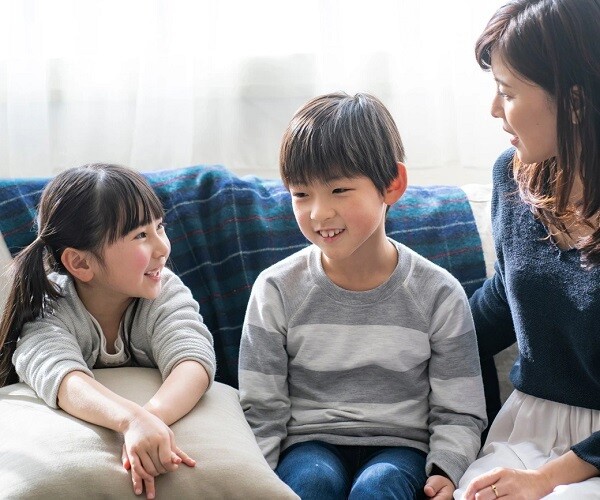It is great that many parents today encourage their children to develop and showcase their talents. However, how can they do so without becoming arrogant?

Illustration photo.
One effective way to teach children how to “show off” is to encourage them to share their achievements naturally and without fanfare. Help children realize that success comes not only from personal effort but also from the support of those around them.
Teaching humility is a long journey but extremely necessary. By encouraging children to showcase their achievements naturally, be grateful for the help of others, and value learning.
To better understand this issue, psychologist Quang Thi Mong Chi provides deeper analysis and suggestions on how children can modestly express themselves, create a good impression on others, and build solid relationships in life.

Psychologist Quang Thi Mong Chi.

Expert letter, The child’s “show off” can come from the need for recognition, but when a child is too confident, what are the consequences?
When children “show off” something – such as good grades, personal achievements, or favorite things – it is not just about pride but also about seeking recognition and affirmation. This is a very basic and natural psychological need.
However, if this “show off” is not properly directed, children can easily become overconfident – that is, they put their ego too high, consider themselves the center, and disregard others.
The first consequence is a reduced ability to build healthy relationships. Children may become less empathetic, less cooperative, or tend to compare and compete unnecessarily with their peers.
Second, children may have difficulty accepting failure or criticism because they are used to always being the best or most prominent. This makes them vulnerable to self-esteem issues when faced with obstacles in learning, exams, or competitive situations.
Another long-term consequence is that children equate their self-worth with achievement and always have to “show off” or perform well to feel valuable. This can put a lot of psychological pressure on them as they grow up, leading to stress, anxiety, or a sense of loss when not recognized.
Therefore, parents and adults need to help children learn to be proud without being arrogant, to be grateful instead of boastful, and to realize that their value comes not only from what they show outwardly but also from their efforts, attitudes, and behavior towards others.

Humility and self-expression are two opposing personality traits. How can we nurture a child to balance these two traits?
In fact, humility and self-expression are not necessarily two completely opposing traits, and a healthy child can be confident in expressing themselves while still respecting others and not taking themselves too extremely.
To nurture this balance, parents need to implement the following guidelines:
Acknowledge and encourage effort instead of just praising outcomes: Instead of saying, “You’re so smart for getting a perfect score,” say, “I noticed your hard work and dedication to your studies.” This helps children feel proud of their efforts without feeling the need to boast about their achievements.
Help children recognize the value of others: Teach them to listen, praise their friends, and share their joy instead of always wanting to be the center of attention. Parents can say, “You did well today, but I also noticed that your friend An has been working very hard. What do you think about that?”
Lead by example: Children learn the most by observing their parents. If parents can demonstrate confidence without being arrogant, express gratitude when praised, and respect others, children will naturally follow suit.
Teach children how to receive compliments and feedback: Guide them to say, “Thank you,” instead of being overly self-satisfied or completely denying their accomplishments. At the same time, help them understand that feedback is an opportunity for improvement, not a diminution of their self-worth.
Encourage collaborative activities instead of pure competition: Through group work, sports, or the arts, children learn to contribute their unique value while respecting the contributions of others.
In summary, the goal is not to eliminate the desire for self-expression but to help children develop a solid foundation for their confidence, linked to humility, respect, and empathy for those around them.

Can the expert share some specific examples of how to encourage children to “show off” modestly?
It is normal for children to want to express themselves and seek recognition from adults. Instead of prohibiting children from “showing off,” parents should guide them on how to share their achievements positively, humbly, and inspirationally. D
Example 1: When your child gets a high score or wins a competition
If your child excitedly tells their friend, “I got a perfect score!”, you can suggest they say it differently: “I’m very happy because I’ve been studying hard and doing well. If you need help, I’d be happy to share my study methods with you!” → This helps your child express their pride while also offering to help others, instead of just boasting.
Example 2: When your child is praised by an adult
If someone compliments your child on their musical performance, instead of responding with, “I know,” teach them to say, “Thank you, I appreciate it. I still practice every day to improve.” → This response shows gratitude, humility, and a desire to continue developing.
Example 3: When your child gets something new
Young children often like to show off their new toys or clothes. Instead of saying, “I’m the best in class because I have this shirt,” suggest they share: “I really like this shirt because it was a birthday gift from my grandmother. I’m so happy!” → This way of speaking still expresses joy but without the sense of superiority or comparison.
Example 4: Practicing at home with parents
When your child does something well (draws a beautiful picture, speaks English well…), instead of just praising them, “You’re so smart!”, you can practice with them to share: “I can tell my teacher: I’ve been practicing at home every day, and I feel like I’m getting better.” → This is a way to teach children how to express their progress realistically, without exaggeration.
If the “show off” is turned into a positive and constructive sharing that expresses gratitude or a desire to learn, it is not only blameless but also helps children develop a healthy confidence, connect, and positively impact others.

What method should parents use when children show arrogance to help them realize and adjust their behavior?
When children display arrogance – such as boasting, comparing themselves to others disrespectfully, or refusing to listen to feedback – it is important for parents not to scold or embarrass them but to use positive and educational feedback.
An effective way is to ask questions instead of directly judging, such as: “How do you think your friend would feel if you said that?” or “Aside from yourself, do you think anyone else is good at this?” Open-ended questions help children reflect and consider the feelings of others, rather than resisting.
In addition, parents can use stories or real-life examples to gently guide children’s behavior. Characters who are humble despite their talents can be positive role models for children to emulate. At the same time, the way parents praise their children also needs adjustment – focus on effort, cooperation, kindness, or progress instead of always praising them as “the best” or “excellent.”
This helps children build self-confidence linked to intrinsic value, not superiority. When children behave inappropriately, parents need to teach them how to apologize and correct their mistakes to show respect for others.
Guide them to sincerely express their desire to make amends. Most importantly, parents themselves need to be living examples: listen, respect others, and demonstrate confidence humbly. Children will learn that maturity does not come from “being better than others” but from recognizing their own worth in their relationships with others.





































